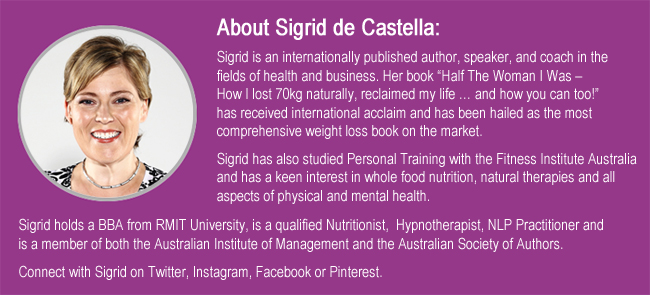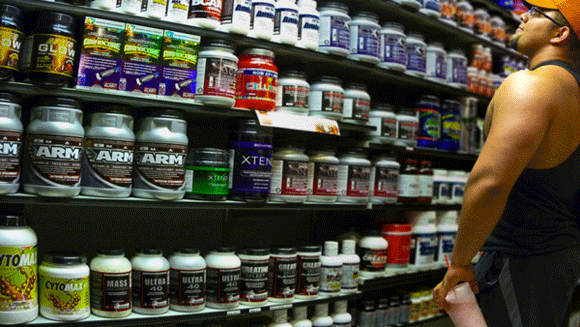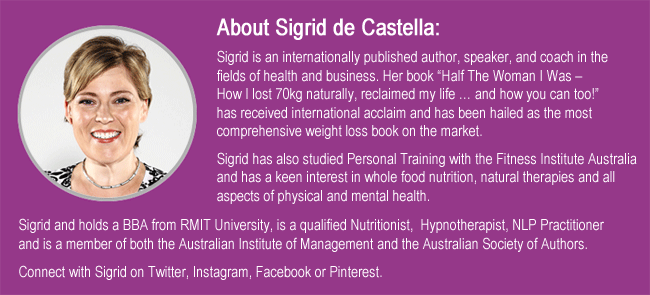The big news is that dieting doesn’t cure obesity … in fact in a study published by National Institute of Health Researchers showed that dieting actually lowers your metabolism which means long-term dieting of any kind will cause metabolic compensation, where your perhaps already low metabolism becomes gradually more and more efficient (i.e. lower still), requiring fewer and fewer calories to maintain your weight.
This means that you’d have to be calorie-deprived for the rest of your life just to maintain your weight, and you might still regain any weight you’ve lost … or even more. So for anyone who wants (or needs) to shed weight this is bad news … really bad news.
It also helps to explain why people (mostly women) throw good money after bad on a plethora of diet programs pills and shakes that don’t work in a fruitless effort to achieve an idea of beauty that doesn’t really exist anyway. It’s completely impossible. No wonder we get depressed.
You know that calorie counting old equation – weight loss or gain = calories in minus calories out, right? Did you know that it’s a complete fallacy? Aargghh … so what’s the answer?
Well, there are actually 4 steps to weight loss … and none of them actually involve dieting.
Secret #1 – Low Carb
The first step to is to correct the type of calories we consume … the reason people gain fat is due to unregulated fat-tissue due to insulin secreted in response to the carbohydrates – anything made from sugar, rice or any flours, including wheat, as well as starchy vegetables like potatoes – we consume.
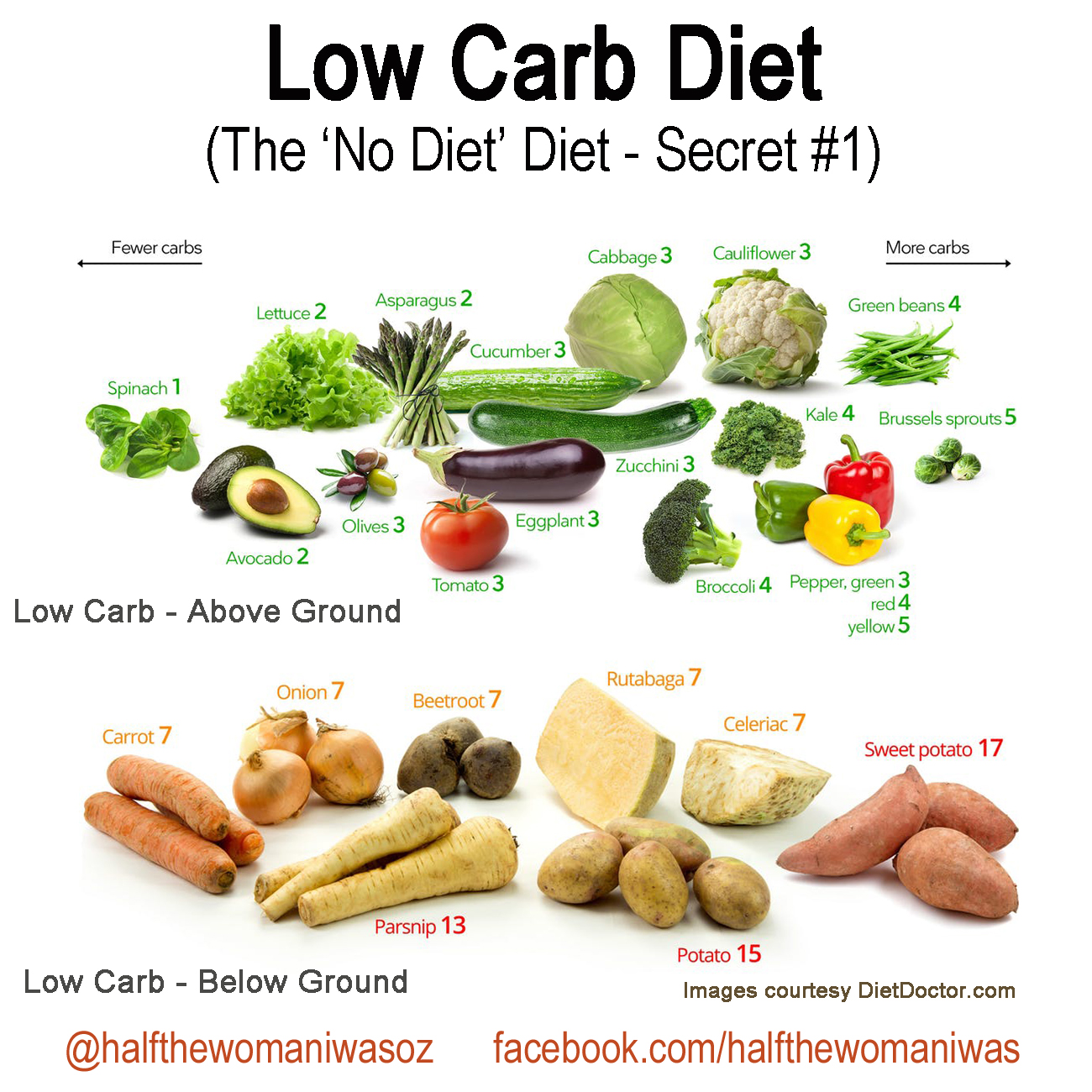
Yes – you heard it – cheap delicious bready wheat-y rice-y soul nurturing carbs … they’re out for good – simple ones anyhow. Unless you want to stay fat. Your choice, you decide. Seriously.
Secret #2 – Portion Size
The second step is serving size. Remember those meal sizes were smaller when you were a kid? And when you go out to dinner at a Dennys, Applebees or Pizza Hut (let alone the plethora of awesome home-cooked restaurants in Melbourne serving huge pates to willing customers) how massive are they now? Eating out should not be about the experience, trying something new, and exploring new tastes … not just bang for buck
But it’s not just portion control you need to monitor. According to the Australian Dietary Guidelines serving size is better describe how much you SHOULD eat of a food, rather than portion size which describes the amount you ACTUALLY eat.
To get the volume you eat down, you simply eat less, right? Well, sort of. The problem is our stomachs have been stretched by ever increasing meal sizes so it’s only logical that the empty space in our stretched stomachs gives off a false sense of hunger that doesn’t really exist. Yep, you’re not REALLY hungry at all.
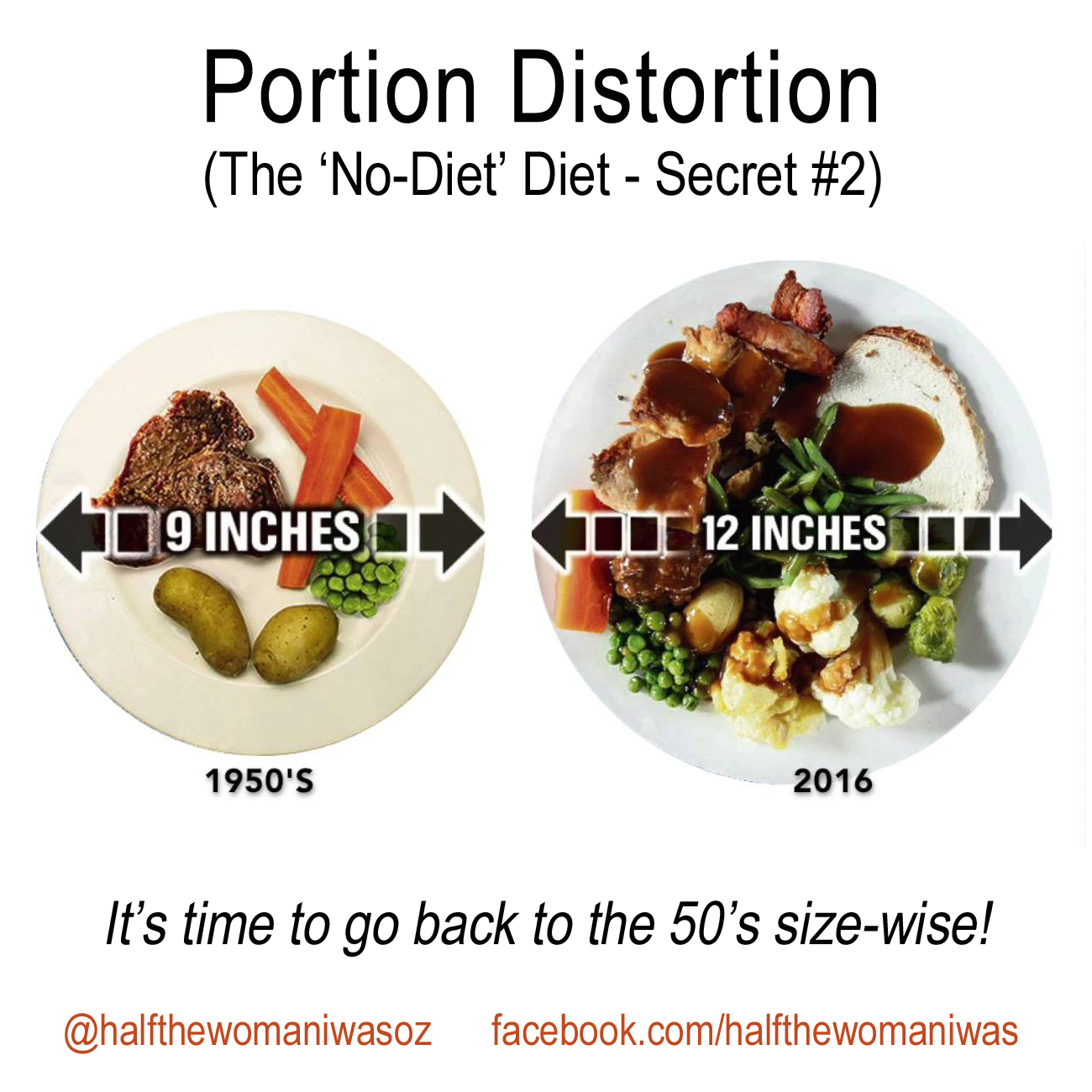
Eating smaller more regular meals is one of the tricks to help retrain your body … 4 meals of 300 to 500 calories over the day (every 3 to 4 hours) can help stabilise your blood sugar and shrink your stomach size.
So what is a serving size? Well that’s kind of the problem. The serve size tables aren’t very specific. Sure they list the number of serves a day of fruit, vegetables, protein and complex carbohydrates but they don’t really say how much a serve is. And to make it worse there’s no actual guideline for food growers or manufacturers for labelling serving sizes on their products – it’s completely up to them. WTF?
So what do you actually need? Well whilst it’s a bit different for everyone (based on body type and cultural differences) but it turns out it is pretty simple – a palm-sized piece of lean protein and 2 to 3 handfuls of vegetables at a meal. You can also have a piece of fruit up to twice a day and a small amount of complex carbohydrates (palm sized) like quinoa or sweet potato. And don’t forget your healthy fats … raw nuts, avocados and olive oil are essential to turning off your hunger hormone ghrelin. Simple, right?
Check out Dr Lisa Young’s other tricks to help you eat less.
Secret #3 – Intermittent Fasting
The third step is frequency of eating and the benefits of intermittent fasting. There’s a been a lot written about the benefits of intermittent fasting and programs like Michael Mosely’s “Eat, Fast and Live Longer” have certainly helped make the concept of fasting centre stage.
The truth is that fasting is in line with our ancestral DNA, and so the act of fasting has a whole host of benefits for our body including weight loss, lower blood pressure, reduced cholesterol, feeling full, fat loss, ketosis, metabolism booster, cardiovascular health and better insulin sensitivity – it’s a pretty amazing list. Which is why intermittent fasting is considered a big part of the cure for diabetes, obesity, heart disease and a plethora of other illnesses.
But which type of fast is right?
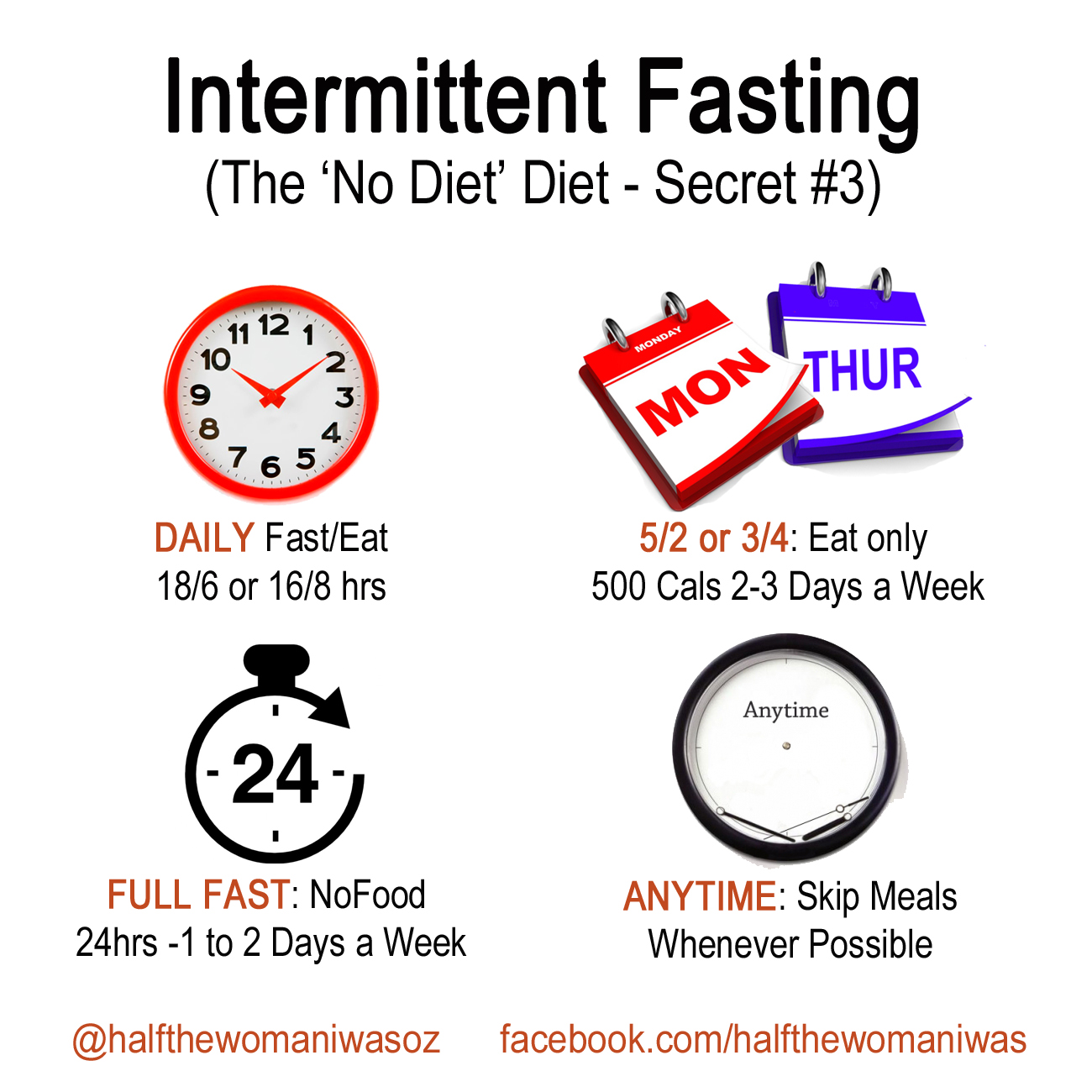
Well it turns out doesn’t really matter which one you do. Personally I do the 18/6 hour fast pretty much daily and I feel better for it. Dr Mosely prefers to 5:2 fast, whilst other people prefer a full fast or anytime fast. Really it depends on what fits in with your lifestyle and how you feel on it. For me it’s easy to finish eating around 7pm and not eat again until 1pm the next day.
The biggest benefit of any fast is that it gives your stomach time to shrink, thereby reducing your capacity for those large meals I mentioned about previously. What this means is you eat less – portion control sorted! And when you consider that every kg (2.2lbs) of fat equates to 7,000 calories you can start to understand why it takes a while to lose any weight you put on.
It took you ages for that weight to gradually come on, right? So the slow burn, the slow loss is always best and losing it slowly will help you keep it off … otherwise you might find that weight again! There is one exception to this rule and it’s something I’ll be talking about next week rapid weight loss .
Secret # 4 – Nutrient Density
The fourth step to losing weight and getting the body of your dreams is nutrition density.
All food is not created equal. The body needs a vast array of micro nutrients in the form of vitamins minerals and trace elements to function optimally. The best sources of all these things are found in a combination of (generally raw) natural foods with one ingredient – apples, oranges, berries, carrots, broccoli, greens, almonds, walnuts, chia seeds, etc.
Cooking and manufacturing processes which turn these ingredients into ‘products’ are less healthy because the raw food is changed. Oils become oxidised through cooking; vitamins are destroyed by manufacturing processes; complex carbohydrates become simple like sugar when ground; and essential fibre is destroyed. And so the destruction goes on.
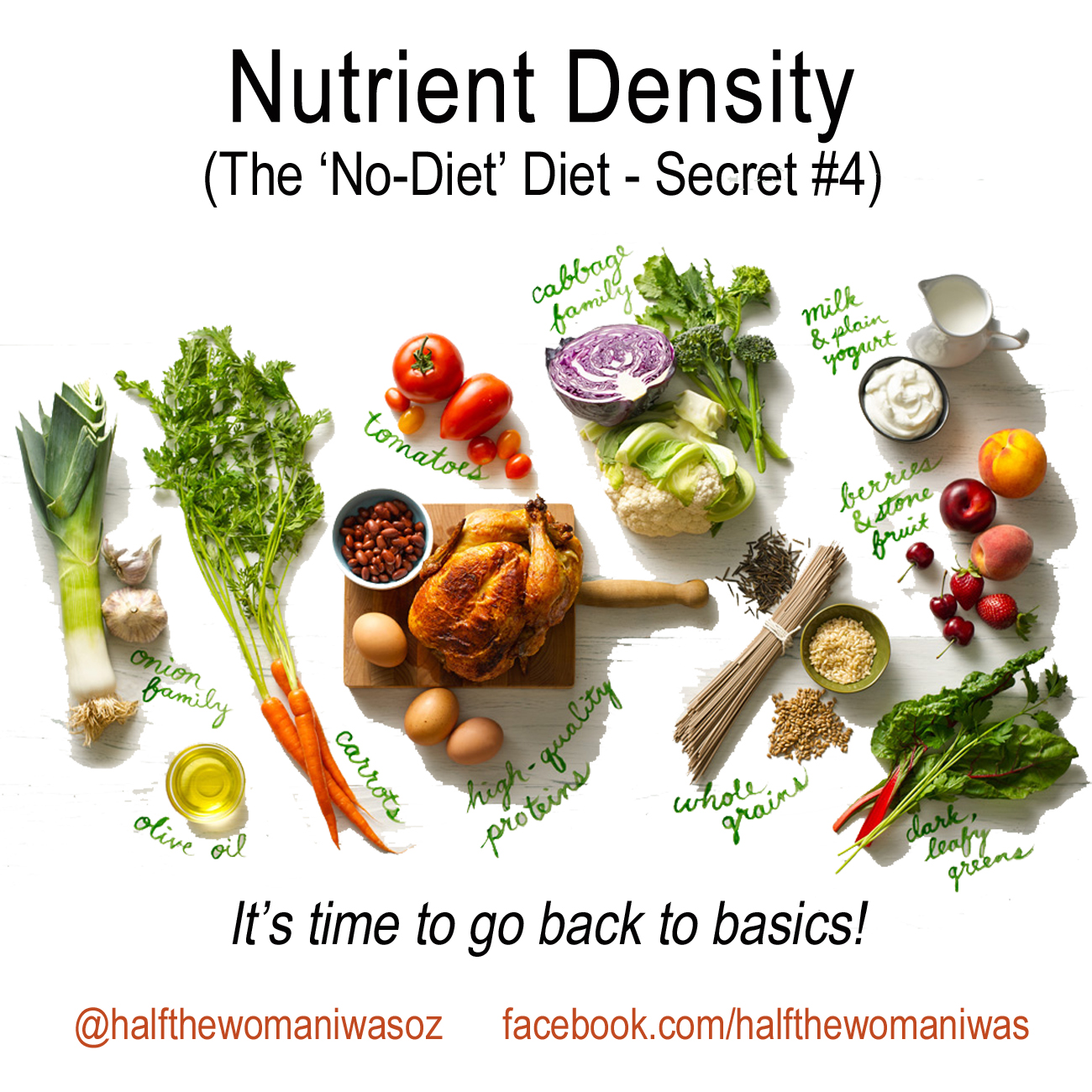
That’s why the best foods are raw and natural, lightly steamed or cooked to enhance texture and taste. Salads featuring a variety of leafy greens are your best option, but we’re not rabbits, and variety is the spice of life, so it’s important to eat a variety of colours and textures.
Although farming practices have improved, many crops are still gown from genetically modified stock in depleted soils with added fertilisers and herbicides which are unnatural. When you’re not eating organic, you’re also eating these additives placing an extra burden on your organs to remove them.
When it comes to eggs and meat those which are organic or bio-dynamic are best. Organic and bio-dynamic produce is grown in rich fertile soils without harmful additives or hormones. And whilst you can’t eat 100% organic all the time, eating local produce (rather than imports) and replacing what you can when you can makes a huge difference to your body and your health.
I’m still not sure how in our technologically advanced world that embraces globalisation, food manufacturers – who pack their products with unhealthy ingredients like wheat, highly ground flours, refined sugars, iodised salt, palm and oxidised oils – manage to get their products on our shelves cheaper than the local farmer with his home grown produce? It’s like we’d rather have a ‘Heston-ised’ thing that looks like something else rather than the genuine article
So aim for products that have just one ingredient, and combine or cook them at home to make super delicious, fresh and vibrant meals. Your body will thank you for it.
Next blog I’ll be talking about rapid weight loss.
#obesity #weightloss #dieting #diet #micronutrients #foodismedicine #portionsize #nutrients #nutrientdensity #oneingredient #backtobasics #foodismedicine #fasting #intermittentfasting #lowcarb #nosugar #lowcarbohydrate #organic #biodynamic #rawfood #rawmovement #raw #servingsize #youarewhatyoueat #metabolism #metabolismbooster #howtoloseweight #beslim #diettricks

